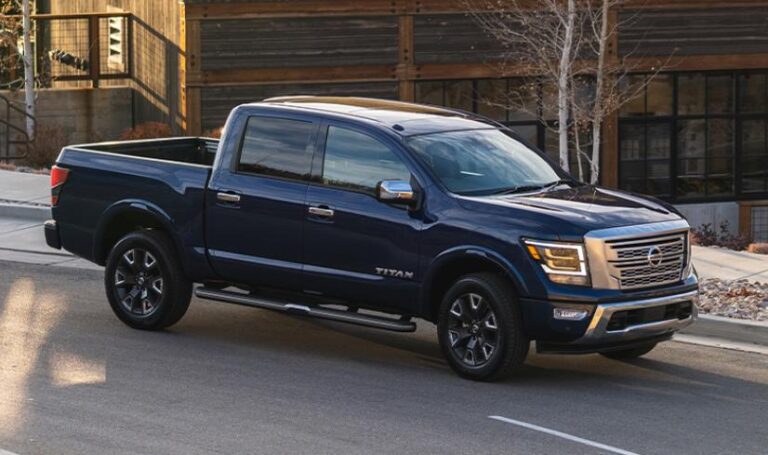How Much Does A Tow Truck Weigh? Answered
If you’ve ever found yourself in a situation where you needed a tow, you’ve likely wondered, How Much Does A Tow Truck Weigh? Understanding the weight of a tow truck is not just a matter of curiosity; it’s essential for safety and operational efficiency. In this article, we’ll delve into the various factors that contribute to a tow truck’s weight and why it matters.
Key Takeaways
- The average tow truck weighs between 10,000 and 15,000 lbs.
- Types of tow trucks include light-duty, medium-duty, and heavy-duty, each with different weight ranges.
- Factors like engine type, construction materials, and towing capacity influence a tow truck’s weight.
- Safety considerations are crucial due to the weight of the tow truck.
- The weight of a tow truck can be found in the owner’s manual or on the manufacturer’s website.
How Much Does A Tow Truck Weigh?
The average tow truck weighs between 10,000 and 15,000 lbs. This weight can vary depending on the type of tow truck and the equipment mounted on it. Here are some general categories:
- Light-duty tow trucks: 5,000 to 10,000 lbs
- Medium-duty tow trucks: 10,000 to 15,000 lbs
- Heavy-duty tow trucks: 15,000 to 25,000 lbs
Types of Tow Trucks and Their Weights
When it comes to tow trucks, there are several types, each with its own specific weight range. Understanding these types and their respective weights can help you make an informed decision when you need towing services. Below are some of the most common types of tow trucks and their approximate weights:
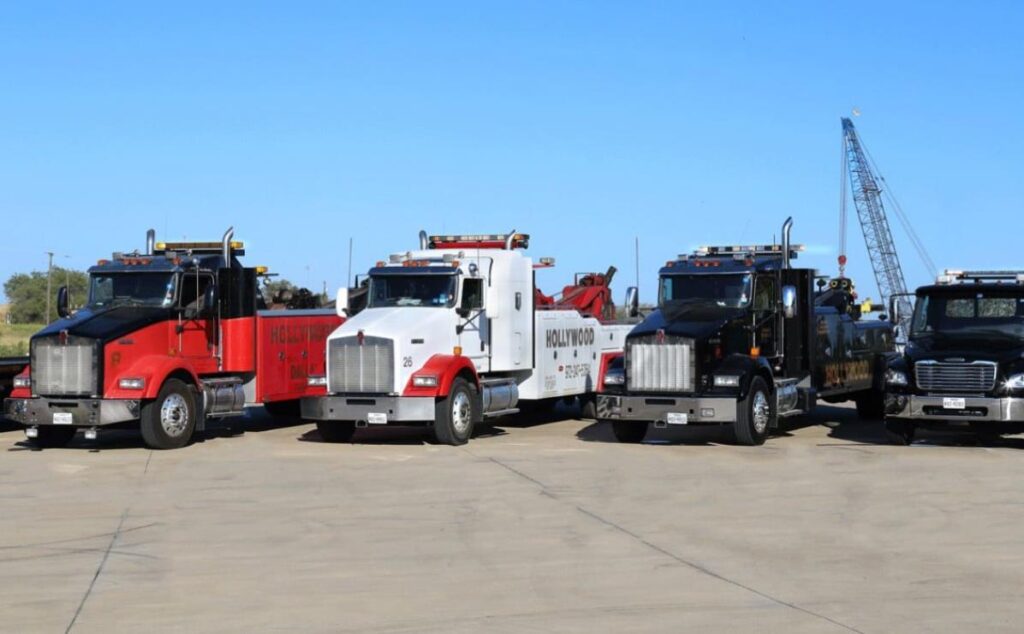
Flatbed Tow Trucks
Flatbed tow trucks are among the most commonly used types for vehicle towing. They feature a long, flat bed at the back where the vehicle can be securely placed.
The weight of a flatbed tow truck can range from 15,500 to 19,500 pounds, depending on the model and additional equipment.
Hook and Chain Tow Trucks
Hook-and-chain tow trucks use a hook-and-chain system to lift the front or rear wheels of a vehicle off the ground for towing.
These trucks are generally lighter than flatbeds, with weights ranging from 10,000 to 14,000 pounds. However, they are less commonly used today due to the potential for causing damage to the towed vehicle.
Wheel-Lift Tow Trucks
Wheel-lift tow trucks use a similar mechanism to hook and chain trucks but are designed to cause less damage to the towed vehicle. The weight of a wheel-lift tow truck can vary between 14,000 to 17,000 pounds, depending on the make and model.
Integrated Tow Trucks
Integrated tow trucks are specialized vehicles used for heavy-duty applications, such as towing buses or other large vehicles. These trucks are equipped with extra axles for added stability and strength. The weight of an integrated tow truck can range from 20,000 to 50,000 pounds.
Boom Tow Trucks
Boom tow trucks are equipped with an adjustable boom winch to recover vehicles from ditches, embankments, or any place where they cannot be easily backed up. These trucks can weigh between 15,000 to 26,000 pounds, depending on the boom’s size and capacity.
Factors Influencing Tow Truck Weight
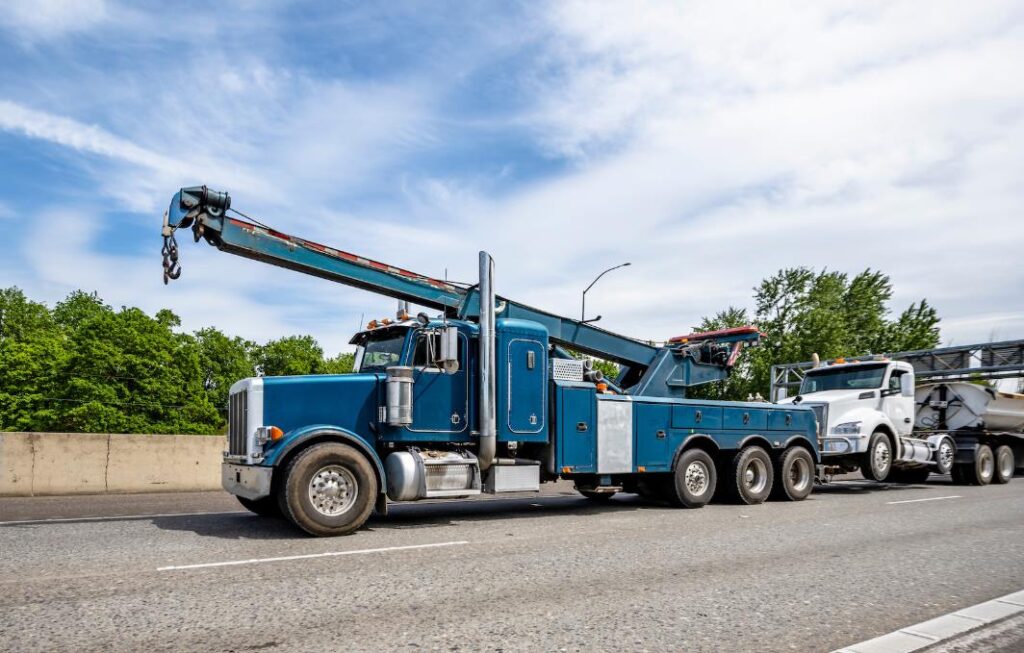
Engine Type
The type of engine can significantly impact the weight. Larger engines used in heavy-duty tow trucks can add hundreds of pounds.
Construction Materials
Materials like steel and aluminum also affect the weight. Aluminum is lighter than steel, reducing the overall weight.
Towing Capacity
The towing capacity of a tow truck can also affect its weight. Trucks designed for larger items will typically weigh more.
Safety Considerations
Being aware of the weight is crucial for the tow truck’s performance, handling, and stopping ability. Overloading can lead to severe safety issues.
How to Find Tow Truck Weight?
Determining the weight of a tow truck is essential for various reasons, including safety, compliance with local regulations, and operational efficiency. Here are some reliable methods to find out how much a tow truck weighs:
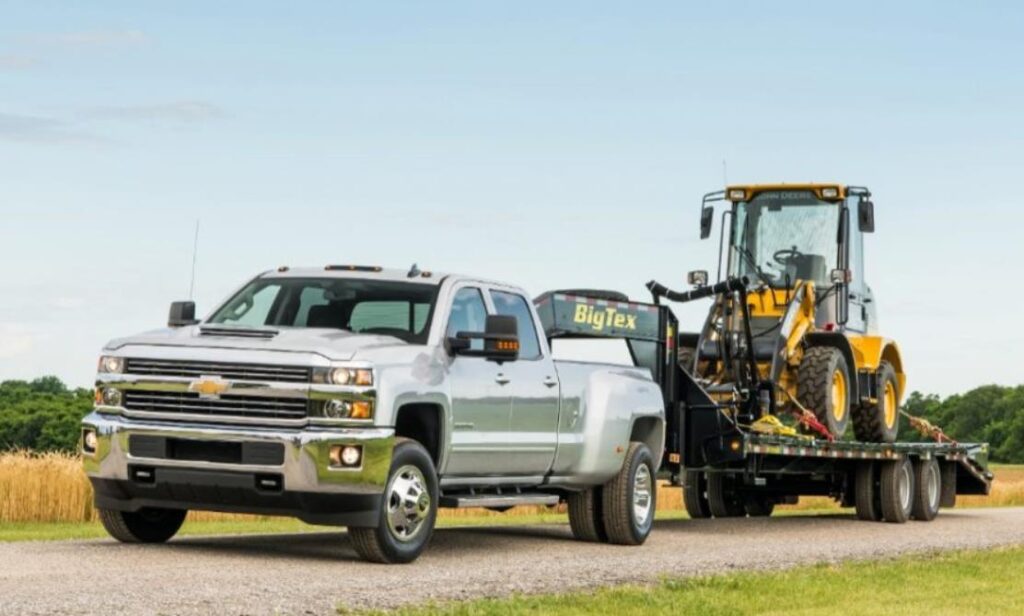
Check the Owner’s Manual
The most straightforward way to find the weight of a tow truck is to consult the owner’s manual. Manufacturers usually list the Gross Vehicle Weight Rating (GVWR) and other weight-related specifications in this document.
Visit the Manufacturer’s Website
Many manufacturers provide detailed specifications of their tow trucks on their official websites. You can usually find information about the truck’s weight under the technical specifications section.
Use a Public Weigh Station
Public weigh stations are another reliable way to determine a tow truck’s weight. These stations are equipped with large scales that can accurately measure the weight of heavy vehicles. Make sure to remove any additional equipment or cargo to get the most accurate reading.
Consult Professional Towing Companies
If you’re still unsure about the weight of a tow truck, consulting a professional towing company can be a good option. They usually have access to accurate weight information for various types of tow trucks and can provide insights based on their experience.
Vehicle Identification Number (VIN)
The Vehicle Identification Number (VIN) can also provide clues about the weight of a tow truck. You can usually find the VIN on the dashboard or inside the driver’s side door and use it to search for weight information online.
Additional Insights into Tow Truck Weights
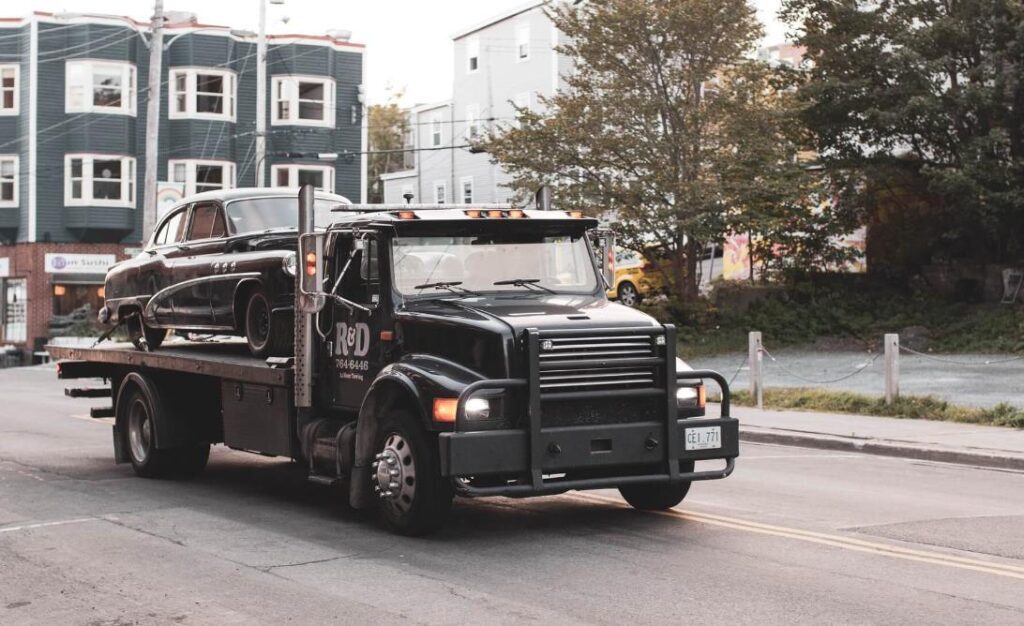
The Role of Equipment in Tow Truck Weight
Winches and Hydraulic Systems
One of the often-overlooked factors that contribute to a tow truck’s weight is the equipment it carries. For instance, winches and hydraulic systems can add a significant amount of weight to the vehicle.
Towing Dollies and Ramps
Towing dollies and ramps are other equipment types that can add to the weight. These are especially common in flatbed tow trucks used for vehicle transportation.
Regional and Legal Considerations
Weight Regulations
Different regions have specific weight regulations for tow trucks. Exceeding these limits can result in fines or legal actions, making it crucial to be aware of local laws.
Permits and Licenses
Some areas require special permits for heavy-duty tow trucks. These permits often come with stipulations regarding the truck’s maximum allowable weight.
Environmental Impact
Fuel Efficiency
The weight of a tow truck directly impacts its fuel efficiency. Heavier trucks generally consume more fuel, contributing to higher operational costs and environmental impact.
Emissions
Heavier tow trucks are also likely to emit more greenhouse gases. This is an important consideration for companies aiming for sustainability.
Technological Advancements
Lightweight Materials
Advancements in materials science are leading to the development of lighter, yet stronger, materials for tow truck construction, reducing their overall weight.
Smart Towing Systems
Emerging technologies like smart towing systems can optimize weight distribution, enhancing safety and efficiency.
Maintenance and Longevity
Weight and Wear and Tear
The weight of a tow truck can influence its wear and tear. Heavier trucks may require more frequent maintenance.
Resale Value
The condition and weight of a tow truck can significantly impact its resale value. Well-maintained, lighter trucks often fetch a higher price.
How Does A Tow Truck Work?
A tow truck is a specialized vehicle designed to move disabled, improperly parked, or impounded vehicles. The basic mechanism involves attaching the towed vehicle to the tow truck and lifting it off the ground, either partially or entirely, for transportation.

There are various methods to achieve this, such as using a hook and chain, wheel lift, or a flatbed. The choice of method depends on the type of vehicle being towed and the specific situation.
Tow trucks are also equipped with additional features like winches, hydraulic systems, and specialized ramps to facilitate the towing process.
What Are The Different Kinds Of Tow Trucks?
There are several types of tow trucks, each designed for specific towing needs:

- Flatbed Tow Trucks: These have a flat bed at the back where the towed vehicle can be securely placed. They are commonly used for transporting cars, motorcycles, and other small vehicles.
- Hook and Chain Tow Trucks: These use a hook and chain to lift the vehicle off the ground. They are generally used for towing older models of cars but are less common today due to the potential for causing damage to the vehicle.
- Wheel-Lift Tow Trucks: Similar to hook and chain trucks but designed to cause less damage to the towed vehicle. They use a metal yoke to lift the vehicle by the wheels.
- Integrated Tow Trucks: These are used for heavy-duty applications and are equipped with extra axles for added stability and strength.
- Boom Tow Trucks: Equipped with an adjustable boom winch for recovering vehicles from ditches or embankments.
Understanding the different types of tow trucks can help you choose the right one for your specific towing needs.
What Is The Heaviest Tow Truck?
The heaviest tow trucks are generally the integrated or heavy-duty tow trucks used for towing large vehicles like buses, trucks, or construction equipment.

These tow trucks can weigh up to 50,000 pounds or more, depending on the make and model. They are equipped with extra axles for added stability and strength, as well as specialized equipment like heavy-duty winches and hydraulic systems to handle the additional weight.
Due to their size and capabilities, these tow trucks are often used for specialized towing tasks and are subject to specific regulations and permits.
How Much Weight Can A Tow Truck Carry?
The weight a tow truck can carry, also known as its towing capacity, varies depending on the type of tow truck and its specific configuration. Here are some general guidelines:

- Light-Duty Tow Trucks: These trucks can typically tow vehicles weighing up to 7,000 pounds. They are often used for towing cars, motorcycles, and small vans.
- Medium-Duty Tow Trucks: These can handle weights ranging from 7,000 to 17,000 pounds and are suitable for towing larger vehicles like delivery trucks, RVs, and small buses.
- Heavy-Duty Tow Trucks: These are designed for the heaviest towing tasks and can handle weights exceeding 25,000 pounds. They are used for towing large trucks, buses, and construction equipment.
It’s crucial to note that exceeding the towing capacity of a tow truck can lead to severe safety risks and may also be illegal, depending on local regulations. Always consult the tow truck’s owner’s manual or a professional towing service for accurate information on towing capacity.
How Many Pounds Is A Tow Truck?
The weight of a tow truck can vary significantly depending on its type, make, model, and any additional equipment it may carry. However, here are some general weight ranges for different types of tow trucks:
- Light-Duty Tow Trucks: These typically weigh between 10,000 and 14,000 pounds.
- Medium-Duty Tow Trucks: The weight for these ranges from 14,000 to 19,000 pounds.
- Heavy-Duty Tow Trucks: These are the heaviest and can weigh anywhere from 20,000 to 50,000 pounds or more.
It’s important to remember that these are approximate figures, and the actual weight can vary. For the most accurate information, consult the vehicle’s owner’s manual or the manufacturer’s specifications.
How Much Is A Heavy-Duty Tow Truck?
The cost of a heavy-duty tow truck can vary widely based on several factors, including the make and model, the type of equipment it comes with, and its overall condition.
New heavy-duty tow trucks can range from $130,000 to $300,000 or more, depending on the specifications. Used models can be significantly less expensive but may require additional maintenance or upgrades.
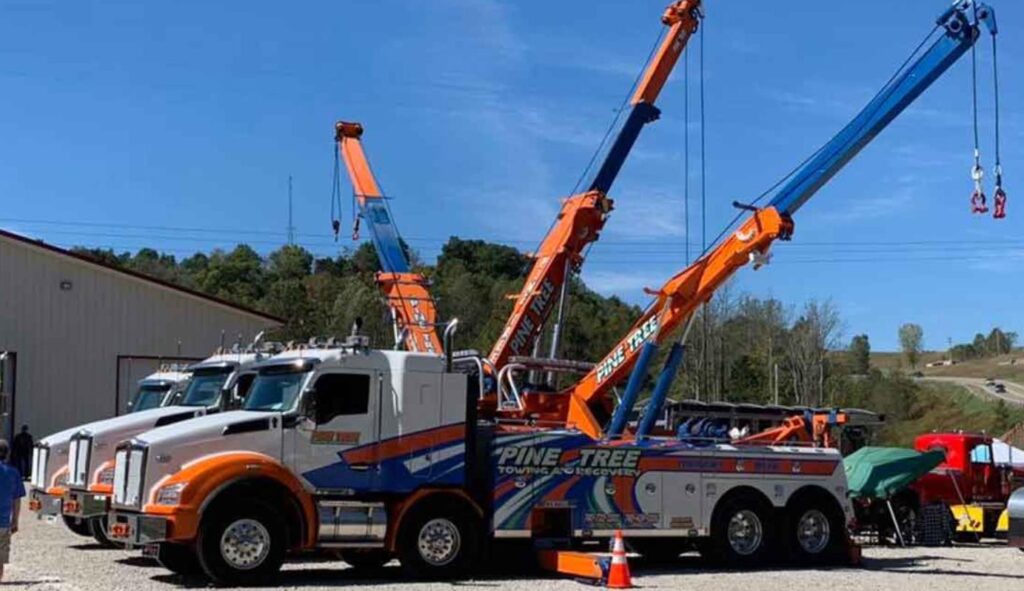
Financing options are often available for those looking to purchase a heavy-duty tow truck, and leasing is another option for businesses that need the truck for a limited period.
It’s essential to consider not just the initial purchase price but also the long-term costs, such as maintenance, fuel, and insurance, when evaluating the total cost of ownership.
How Much Is A Big Tow Truck?
The term “big tow truck” can be somewhat subjective but generally refers to medium-duty to heavy-duty tow trucks designed for towing larger vehicles.
The cost of a big tow truck can vary based on its capabilities, equipment, and condition. New models can range from $80,000 to $200,000, while used options may start as low as $40,000.
Just like with heavy-duty tow trucks, it’s crucial to consider the total cost of ownership, including maintenance, fuel, and insurance, when determining the overall cost. Financing and leasing options are also commonly available for those looking to acquire a big tow truck.
Conclusion
Understanding how much a tow truck weighs is crucial for various reasons, including safety and towing capacity. The weight can range from 5,000 to 25,000 pounds, influenced by factors like engine type, construction materials, and towing capacity. Always refer to the owner’s manual or manufacturer’s website for accurate information.
People Also Ask
What size tow vehicle do I need?
Choosing the right size tow vehicle requires taking several factors into consideration, including the weight and dimensions of the vehicle to be towed, the type of towing required, road conditions, and the distance to be traveled. It’s recommended to seek the advice of a professional towing service to ensure the best match between your vehicle and the tow truck.
What is the formula for tow truck towing capacity?
The towing capacity of a tow truck is influenced by a range of factors, including the engine power, transmission system, and weight of the truck itself. To determine the best tow truck for your needs, consider consulting a professional towing service for a comprehensive evaluation and recommendation.
What is the 85 towing rule?
The 85 towing rule is a guideline for safe towing practices, which states that the total weight of the towing vehicle and trailer should not exceed 85% of the weight of the vehicle being used for towing. This rule is implemented to ensure that the towing vehicle has the necessary capacity to safely transport the load.
What’s the maximum permitted speed for a car towing?
The speed restrictions for towing a vehicle vary by region and state regulations. However, as a general rule, the maximum speed while towing is typically limited to the regular speed limit for other vehicles on the road. It’s important to familiarize yourself with local and state regulations to determine the exact speed restrictions when towing.
What is the maximum distance allowed between towing and towed vehicles?
The distance requirements between the towing and towed vehicles vary by jurisdiction and state regulations. However, the typical distance requirement is limited to a few feet to ensure stability and safety during the towing process. To determine the specific distance requirements in your area, consult local and state regulations.

Welcome to the exhilarating world of Matt Rex, a professional car racer turned renowned vehicle enthusiast. Immerse yourself in his captivating blog as he shares heart-pounding adventures, expert reviews, and valuable insights on cars, trucks, jets, and more. Fuel your passion for speed and discover the beauty of vehicles through Matt’s engaging stories and meticulous expertise. Join the ever-growing community of enthusiasts who find inspiration and expert advice in Matt Rex’s blog—a digital hub where the thrill of speed meets the pursuit of knowledge.




![What Year Chevy Truck Tailgates Interchange? [Answered]](https://www.turbochaos.com/wp-content/uploads/2023/12/What-Year-Chevy-Truck-Tailgates-Interchange-768x513.jpg)
